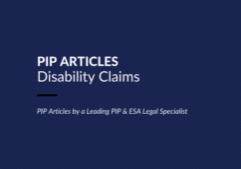PIP Appeal in Inverness
My plans to fly to Inverness for my first hearing there were wrecked when an afternoon tribunal hearing in Cardiff overran and made it impossible to get to Bristol Airport in time. There was nothing else for it but to drive as I was not going to let the client down. Everything worked out and that appeal was allowed. It was less tiring to fly to Inverness for this appeal and we had a modern court building rather than the quaint room in a church on my last visit.
This client, K, had been awarded just 2 points for the daily living component and nil for mobility. My advice from the start was that his appeal was not an easy one but that I considered him to have a better than even chance of success. His hearing was not a routine on, in that the tribunal required K’s partner to be outside the room when the client gave his evidence. I have only seen this a handful of times in 23 years but I consider it to be helpful as it allows them to give more weight to the witness’s evidence when they can see that it was not influenced by what they heard during the hearing. I was very pleased with the evidence they both gave.
K’s mobility claim was based on his anxiety and for us to succeed, the tribunal would have to accept that he needed to be accompanied on any journey ‘to avoid overwhelming psychological distress’. My view was that the meaning for that wording that the DWP included in the appeal papers was a gross distortion so took my huge Oxford English Dictionary to Scotland to support the meaning that we said the phrase should have.
I did not expect a call from the client after I landed back in Bristol but K had called the tribunal, just on the off chance, and had been told that he appeal had been allowed, with an award of the enhanced rate of the mobility component. A good outcome as I consider this to generally be more difficult to get, especially when the claim is based purely on mental health.


 ESA and PIP appeals in Birmingham
ESA and PIP appeals in Birmingham